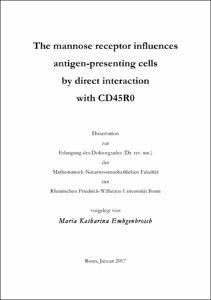The mannose receptor influences antigen-presenting cells by direct interaction with CD45R0

The mannose receptor influences antigen-presenting cells by direct interaction with CD45R0

| dc.contributor.advisor | Burgdorf, Sven | |
| dc.contributor.author | Embgenbroich, Maria Katharina | |
| dc.date.accessioned | 2020-04-23T23:05:04Z | |
| dc.date.available | 2020-04-23T23:05:04Z | |
| dc.date.issued | 15.05.2017 | |
| dc.identifier.uri | https://hdl.handle.net/20.500.11811/7192 | |
| dc.description.abstract | The immune system has to manage the critical decision to induce either immunity or tolerance. Cells that take part in the regulatory processes of the immune system are amongst others antigen presenting cells (APCs), especially dendritic cells (DCs) and macrophages (M φΦs). Recently, it was shown that the mannose receptor (MR), known as an endocytic receptor expressed by specific APCs, is responsible for the induction of T cell tolerance. Under non-inflammatory conditions, the MR expressed by DCs can bind to CD45 on CD8+ T cells. The interaction of MR and CD45 induces the inhibition of CD45 phosphatase activity. Thereby, transcriptional T cell re-programming and up-regulation of CTLA-4 in T cells are initiated resulting in T cell tolerance. As CD45 is not only expressed by T cells but by all hematopoietic cells including APCs, the aim of this thesis was to investigate a putative influence of the MR on APCs by interaction with CD45. We could show that GM-CSF induced, bone marrow derived APCs (BM(GM-CSF) cells) express the lowest molecular isoform of CD45, CD45R0, that interacted with a recombinant MR construct comprising the CR, FN II, and CTLD1-2 domains of the MR (FcMR). This interaction impaired CD45 phosphatase activity in BM(GM-CSF) cells and altered intracellular signalling pathways. The capacity of APCs to stimulate antigen-specific T cells was altered by binding of FcMR to CD45. Antigen-specific T cells primed by FcMR pre-stimulated APCs showed reduced cytokine secretion of CD4+ T cells determined by IFN- γΓ levels and diminished cytotoxic activity of CD8+ T cells, although, proliferation of T cells remained unaffected. In addition, the application of supernatant containing soluble mannose receptor (sMR), that is shed by MR-positive cells, to stimulate BM(GM-CSF) cells also decreases CD45 phosphatase activity but in contrast supports an immunstimulatory phenotype of activated antigen-specific T cells. Recently, sMR was found to be highly elevated in several diseases. Here, we could show enhanced sMR serum levels after high-fat died or obesity in mice and human, respectively, pointing out a direct correlation of sMR expression and inflammatory metabolic processes. | en |
| dc.language.iso | eng | |
| dc.rights | In Copyright | |
| dc.rights.uri | http://rightsstatements.org/vocab/InC/1.0/ | |
| dc.subject | Immunsystem | |
| dc.subject | Rezeptor | |
| dc.subject | Zellaktivität | |
| dc.subject | Dendritische Zelle | |
| dc.subject | Makrophage | |
| dc.subject | T-Zelle | |
| dc.subject.ddc | 500 Naturwissenschaften | |
| dc.title | The mannose receptor influences antigen-presenting cells by direct interaction with CD45R0 | |
| dc.type | Dissertation oder Habilitation | |
| dc.publisher.name | Universitäts- und Landesbibliothek Bonn | |
| dc.publisher.location | Bonn | |
| dc.rights.accessRights | openAccess | |
| dc.identifier.urn | https://nbn-resolving.org/urn:nbn:de:hbz:5n-47378 | |
| ulbbn.pubtype | Erstveröffentlichung | |
| ulbbnediss.affiliation.name | Rheinische Friedrich-Wilhelms-Universität Bonn | |
| ulbbnediss.affiliation.location | Bonn | |
| ulbbnediss.thesis.level | Dissertation | |
| ulbbnediss.dissID | 4737 | |
| ulbbnediss.date.accepted | 06.04.2017 | |
| ulbbnediss.institute | Mathematisch-Naturwissenschaftliche Fakultät : Fachgruppe Molekulare Biomedizin / Life & Medical Sciences-Institut (LIMES) | |
| ulbbnediss.fakultaet | Mathematisch-Naturwissenschaftliche Fakultät | |
| dc.contributor.coReferee | Weighardt, Heike |
Dateien zu dieser Ressource
Das Dokument erscheint in:
-
E-Dissertationen (4379)




